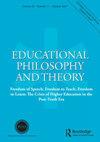Toward a coherent critical theory of learner autonomy in language learning: Exploring its political implications in higher education and limitations in the literature
IF 1.8
4区 教育学
Q2 EDUCATION & EDUCATIONAL RESEARCH
引用次数: 0
Abstract
Abstract The literature on autonomous language learning reveals both, scholars’ great enthusiasm for the revolutionary potential of learner autonomy as well as pessimism for its continual depoliticization within higher education. Similar to how ‘learner autonomy’ is still today an unfinished construct that raises considerable confusion among scholars, the critical theory of learner autonomy in the field of language learning remains largely unexplored; and thus, yet to be fully articulated. Building on the relevant literature, this article attempts to provide a coherent and nuanced theoretical framework for the critical practice of learner autonomy in higher education. Results show how the field of language learning is dominated by uncritical and apolitical approaches that render learner autonomy a politically impotent practice. Critical autonomous language learning must be both critically aware—so it can raise students’ awareness of the structural and discursive constraints on their autonomy—and politically active—so it may lead to education reform and social change—, while also aiming at reaching the highest levels of institutional material support and student control possible.走向语言学习中学习者自主性的连贯批评理论:探索其在高等教育中的政治含义和文献中的局限性
本文章由计算机程序翻译,如有差异,请以英文原文为准。
求助全文
约1分钟内获得全文
求助全文
来源期刊

Educational Philosophy and Theory
EDUCATION & EDUCATIONAL RESEARCH-
CiteScore
4.20
自引率
15.00%
发文量
171
期刊介绍:
Educational Philosophy and Theory publishes articles concerned with all aspects of educational philosophy. It will also consider manuscripts from other areas of pure or applied educational research. In this latter category the journal has published manuscripts concerned with curriculum theory, educational administration, the politics of education, educational history, educational policy, and higher education. As part of the journal''s commitment to extending the dialogues of educational philosophy to the profession and education''s several disciplines, it encourages the submission of manuscripts from collateral areas of study in education, the arts, and sciences, as well as from professional educators. Nevertheless, manuscripts must be germane to the ongoing conversations and dialogues of educational philosophy.
 求助内容:
求助内容: 应助结果提醒方式:
应助结果提醒方式:


